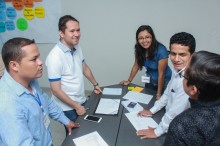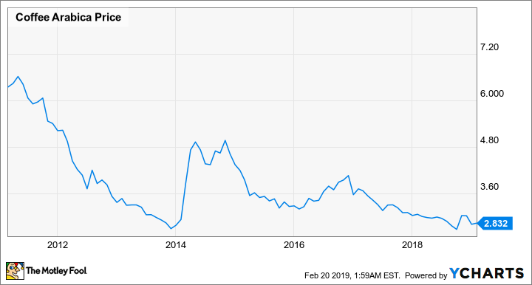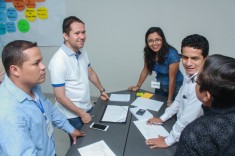Wake up and smell the coffee
 04 February 2021
04 February 2021 Price volatility ranks alongside climate change as one of the most significant risks faced by smallholder coffee farmers in Latin America. Through an Oikocredit-led capacity building programme, smallholder farmer associations have been able to strengthen their price risk management (PRM) skills.
“Wake up and smell the coffee”, is a common saying about becoming aware of the reality of the situation you are in. You could say this is true for the coffee producers, as it’s no longer just about growing and selling coffee. Smallholder farmers need to be checking the prices of coffee every morning and deciding on the price risk strategies to cover their production. This is where one of Oikocredit’s latest capacity building projects takes us, and as you may expect, it’s far from a simple story of: farmer improves income by growing coffee.
Oikocredit working with Fair Trade USA and the US-based Catholic Relief Services, has come to the end of a three-year project to support smallholder coffee farmer associations. The goal of the project has been to enable these associations to improve their price risk management (PRM), using “physical” as well as financial strategies to achieve more stable coffee prices for the smallholder farmers in Latin America.
Physical and financial price risk management
We talked with Yolirruth Nunez, Oikocredit’s Social Performance and Capacity Building Officer based in Peru, to understand more about the project and about price risk management. Yolirruth was an adviser to the project, and she explained the basics of PRM.

Yolirruth told us how price risk is an issue for the many farmers, buyers, finance institutions and others who work in the coffee value chain. Price risk is the risk that the income of an enterprise may decline due to market price fluctuations for coffee when it is traded. We know that most agricultural commodities experience this market price volatility, and the level of volatility can change unexpectedly.
She also explained physical price risk management of production and sales, which uses the contract conditions with buyers, fixed-price and sales policies, or purchase policies with the farmers. There are still many risks involved, so the more complex tools of financial price risk management may also be employed. An example is to purchase a financial derivative to hedge against a negative movement in coffee prices. This project involved training coffee associations in both physical and financial price risk management.
Working with 22 farmer associations representing 32,200 smallholder farmers
The project was aimed at the level of the coffee farmer associations , with the objectives to:
- strengthen organisational, financial and managerial capability for mitigating price risk
- develop a tool to support the analysis of information and decision making for the implementation of PRM strategies, that builds the knowledge and confidence of staff
- facilitate peer-to-peer learning on best practices of PRM
- train staff in the implementation of physical and financial strategies to mitigate price risk.
There were 22 smallholder associations (some already Oikocredit partners) selected to support them to take on the responsibility of managing the financial price risk strategies themselves. The final reports will be published on the IDB Lab website at bidlab.org later in the year.
This project was supported by funding from the Interamerican Development Bank’s LAB via the SAFE Platform and from Keurig Dr Pepper, with co-investment from Oikocredit, Catholic Relief Services and Fair Trade USA.
Improved capacities of the farmer organisations
The evaluation report shows that the capacities of these farmer associations (Oikocredit partners and potential partners) have improved substantially, and the competencies of both the staff and managers have been strengthened. The general perception of the participants was that they were better prepared for the future. Many of the participating organisations have internalised new practices in the core areas of the project, namely: governance, management and information systems.
Stable downturn in international coffee pricing
During the course of the project, coffee prices have been on a stable downturn. So the market price has been lower than the minimum guaranteed price of fair trade contracts. The evaluation reported that “91% of the participating cooperatives have more than 40% of their portfolio with fair trade contracts”. Therefore, “There has been neither great price volatility nor a great perception of risk”, amongst the farmer associations. Nevertheless, as Yoliruth told us, “Even if they have fair trade certification, buyers do not necessarily buy all the coffee as fair trade certified, so organisations need to sell the other part as conventional, and then they are subject to price risk for that part of their crop”.
So there was little incentive to use financial hedging strategies as many producer organisations were able to manage price risk using physical strategies alone. As the reports says: “The cooperatives have been prepared to navigate financial storms and we have found ourselves in a context of calmed waters”. So this element of the project has yet to be fully put to the test.
The power of peer-to-peer visits
A seemingly small element of the project was peer-to-peer visits between the associations and this has had a greater impact than expected. The report outlines how, “Just the fact of being able to be with leaders from so many other cooperatives, from other countries, with other cultures and ways of doing things; it has been a result in terms of exchange of knowledge, learning and ideas”.
One of the participants said: “The peer-to-peer visits had allowed us to have a change in the way we think about facing risks and how to look for the right tools that will help us to take the right decisions”.
Yolirruth was keen to tell us about future plans, “Oikocredit and its partners are now working on plans to extend the programme to Africa and also to expand the coverage in Central America”. And we’ll be sure to report on that in the future.
When you wake up tomorrow and smell your morning coffee, will you think about the complexities of price risk management (PRM)? That’s unlikely for most of us but we have given you a flavour of what PRM is all about. So sit back, enjoy your coffee and thank the coffee producers who have to think about the complexities of PRM!

